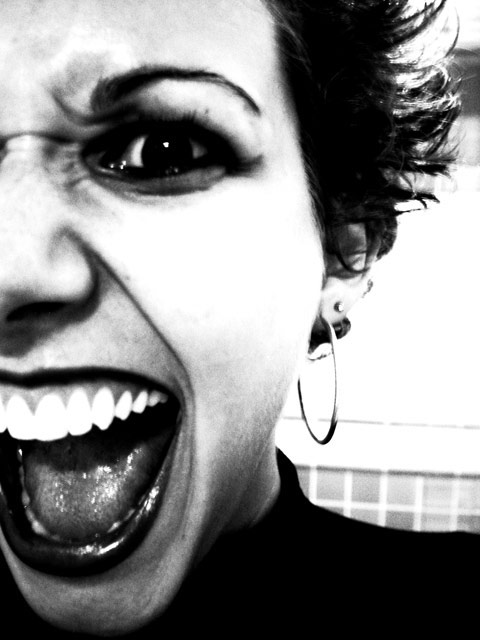Curiosity's Evil Twin Can Drive You Insane

It's that time of year again. Gifts are appearing under Christmas trees, and people — especially kids — are itching to find out what's in those boxes and bags. In many homes, curiosity gets the better of a child, as evidenced by hastily re-taped wrapping paper and ribbons in disarray.
There's a real reward to finding out what's under the tree, of course: a new gadget that's yours to keep, or the necklace you've been coveting for months. In other situations, though, the biggest rewards of curiosity are knowledge, stimulation and other intangibles. And for the most part, researchers who study curiosity have seen it as a positive thing, driven by a love of newness and learning.
But in recent years, some researchers have questioned that view of curiosity. These researchers don't disagree that people seek out knowledge for knowledge's sake. But what they're interested in is the dark side of curiosity, the kind that's more akin to dying to know what's under the Christmas tree than to cracking open a book on a favorite topic. In this view, curiosity is like an itch people desperately want to scratch.
"It's the difference between, 'Oh, that's cool,' and 'Aha!' Jordan Litman, a research scientist in psychology at the University of South Florida, told LiveScience. "To get there, you have to go through, 'Oh, dammit, it's bothering me!"
Information gap
The idea of curiosity as an itch harkens back to research done in the 1960s and earlier. At that time, scientists saw curiosity as a drive that forces animals to reduce uncertainty about their environment. The theory explained why animals like to explore new objects, but it left out the question of why animals and humans go out of their way to look for new things that can titillate their minds. After all, if the goal is to find information to reduce curiosity, why would anyone raise their curiosity levels in the first place by starting a puzzle or reading a murder mystery?
This "drive theory" fell out of favor as researchers focused on arousal, the idea that individuals seek a certain level of excitement from moment to moment. But for researchers like Litman that theory doesn't fit, either.
Get the world’s most fascinating discoveries delivered straight to your inbox.
"The problem there is that optimal arousal involves always approaching the unknown to increase stimulation, but never resolving it," Litman said. In other words, once someone reaches an optimal level of curiosity about something, finding out the answer would reduce arousal, ruining the balance.
Instead, Litman and others argue, some curiosity may be driven by our awareness of the gaps in our knowledge. As anyone who's been to a trivia night can attest, nearly knowing an answer is more frustrating than being clueless — or even being sure of yourself.
"One of the greatest ways to seriously piss someone off is to throw out some trivia question at them and just don't tell them the answer," Paul Silvia, a psychologist at the University of North Carolina at Greensboro, told LiveScience. "It will seriously drive them insane."
Trivial pursuits
The information gap theory of curiosity isn't ignored in the curiosity field, but it's isn't exactly celebrated, either. Silvia, for example, agrees that it happens, but thinks it's a minor part of a bigger picture.
"That's kind of the small stuff, because most learning, people are doing for its own sake," Silvia said. "It's not because they feel bad because they don't know it."
Litman, on the other hand, argues that plenty of learning is unpleasant, yet people struggle through to get the desired information. It's like food, he said. You can "snack" on knowledge to stifle boredom and entertain yourself, but strong curiosity is more like a nutritional deficit you need to fill.
"Sweet things are pleasurable in the absence of appetite… but they're much better when you're hungry," Litman said.
Both views have studies to support them. The developer of the information gap theory, Carnegie Mellon University behavioral economist George Loewenstein, conducted an experiment in 1992 in which he asked people to click on squares on a computer screen to familiarize themselves with the computer's mouse. In reality, Loewenstein was trying to simulate the volunteers' curiosity: For some participants, there was a picture of an animal behind each square. For others, there was a portion of a photo of an animal.
Loewenstein and his colleagues suspected that people who uncovered bits and pieces of a picture with each click would click more to find out what the full picture was. They were right. It seems, Litman said, that a little bit of information whets the brain's appetite for more.
Litman's research on individual differences in curiosity has found separate domains of the emotion. The deprivation-type of curiosity seems to be driven by tension and dissatisfaction, Litman reported in 2005 in the journal Cognition and Emotion, while the interest-type of curiosity seems motivated by positive emotions.
A more recent study, published in 2009 in the journal Psychological Science, failed to find any evidence of a neural "itch" in brain scans. [Read: Your Brain on Curiosity]
"It doesn't mean the itch story is completely wrong, it just didn't seem to work in our data," study researcher Colin Camerer, a behavioral economist at the California Institute of Technology, told LiveScience.
Camerer and his colleagues did find that people's curiosity about trivia questions is most intense when they're equally split between thinking they know the answer and don't.
"There may be something very deep-seated about being torn between two things that are equally likely," Camerer said.
According to Litman, those findings echo his research on the "tip-of-the-tongue" phenomenon. Being tantalizingly close to knowing an answer — having it on the tip of your tongue — is incredibly frustrating for people, he said. In contrast, when people know nothing about an answer, their curiosity is both less intense and more pleasant.
Curious about curiosity
Perhaps the biggest struggle in the curiosity field is that so few people seem to be, well, curious about it. The trend in psychology has been to view the brain like a computer, Camerer said, and since computers aren't curious, curiosity research seems "kind of stale."
But there are many questions left to be asked on the topic, researchers say. Camerer has found that people will expend time and resources to find out answers to trivia questions. In other words, he said, information has value, and curiosity levels can influence that value.
Camerer and his colleagues have recently been investigating how paying people to answer questions influences their curiosity about information. Preliminary results suggest that payment actually increases curiosity, even after people aren't getting paid anymore.
"It's almost like the money is an introductory discount," Camerer said.
Even on the lighter side, questions remain about why certain information grabs people's interest, Silvia said. His work suggests that a combination of newness and understanding pique interest. People seem to like things that are new but comprehensible.
"Being different in a way that people can still understand and still get is the sweet spot," Silvia said.
Meanwhile, a happy-go-lucky view of curiosity fails to explain morbid curiosity, Litman said. He's done experiments in which people can choose to look at unpleasant pictures or not. Many people will decide to view the pictures, despite being obviously upset by them.
"Humans will go out of their way to see something awful that will give them nightmares," Litman said. He suspects that the drive to get knowledge about what the pictures contains outweighs the desire to avoid becoming upset.
"It's a more complex model, because it forces you to understand that the brain is oriented to make sense of the world even if the result is unenjoyable," Litman said. The next step, he said, is to find out whether it's more rewarding to resolve the happy interest-type curiosity or the tense deprivation-type.
"It may have to do with basic elements of the human brain that desire coherency," he said. "The closer you are to a coherent thing, perhaps it's more troubling when you can't get to the coherent whole."
You can follow LiveScience Senior Writer Stephanie Pappas on Twitter @sipappas.

Stephanie Pappas is a contributing writer for Live Science, covering topics ranging from geoscience to archaeology to the human brain and behavior. She was previously a senior writer for Live Science but is now a freelancer based in Denver, Colorado, and regularly contributes to Scientific American and The Monitor, the monthly magazine of the American Psychological Association. Stephanie received a bachelor's degree in psychology from the University of South Carolina and a graduate certificate in science communication from the University of California, Santa Cruz.


